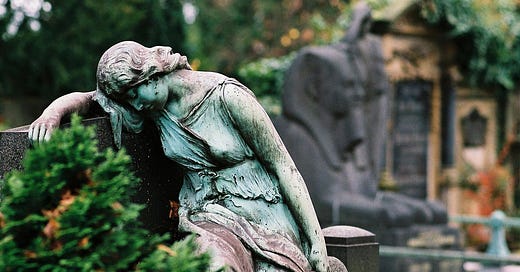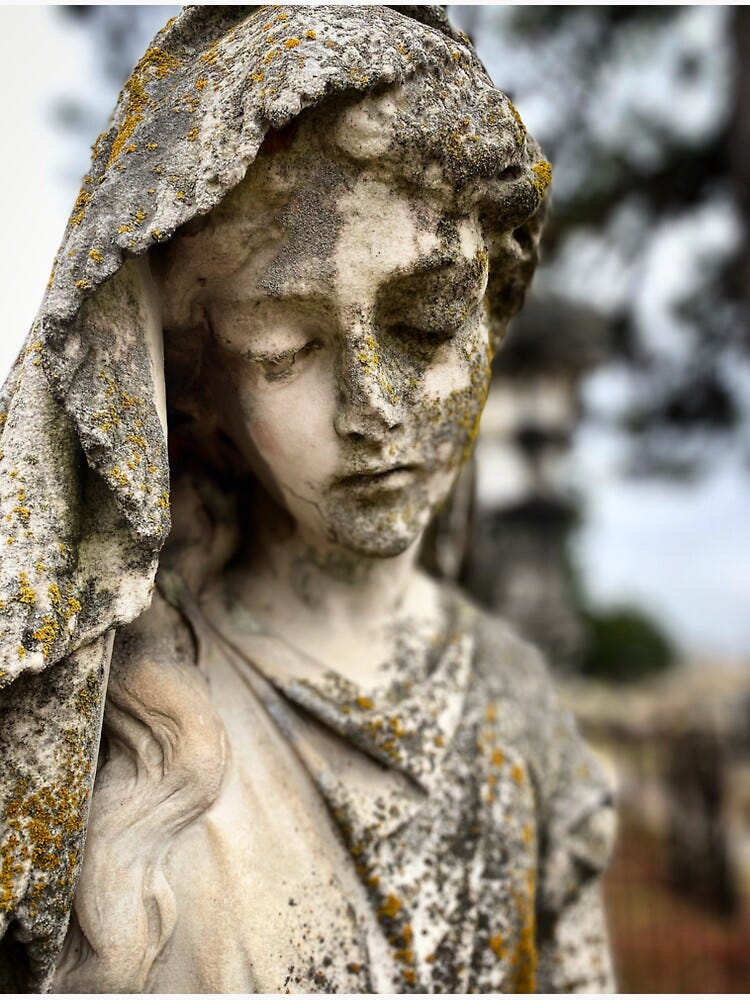ON THE LOSS OF A PARENT - INTRO
Introducing a new limited series on Substack
“Be grateful for whoever comes, because each has been sent as a guide from beyond.” ~ Rumi
INTRODUCTION TO THE INTRODUCTION
In recognition of the one-year anniversary of my dear father’s passing—which was November 4th—and of my late mother’s birthday—which is today—I am starting a new Substack newsletter “On the Loss of a Parent” in their honor. As a human, a daughter, a sister, a Buddhist practitioner and meditation instructor, an artist, an author, a seeker, a flawed but Wise Woman with a strange mind, a singer of sacred chant, a writer who seems to like to write long sentences with tangents and parentheticals, a healer and Sowa Rigpa practitioner, and—most especially—as an adult in her 50s who suddenly finds herself being nobody’s child anymore, my aspiration is that by sharing how how I have been coping with loss and grief, I'll help others cope with loss and grief. Because, after all, when one of us heals, we all heal.
In this series I'll also likely write about family dynamics at times of death, and/or about the failings of the American medical system at the time of death (and during life), and/or the Buddhist view of and approach to death, particularly the dynamics of being the only Buddhist within a Christian-influenced family, and/or about the beauty of ancestral healing, and definitely about how to move on when you don't get to have "that final conversation" with a parent before he/she dies. I still don’t have the final answer to the latter, which is one of the main reasons I am writing this series. Perhaps I will write my way into some sort of resolution or absolution, and anyone who reads this can come along for the ride and experience (hopefully) the glory of liberation from our own self-inflicted guilt at the end.
Another thing I want to clarify is that I am not going to edit these posts much. That is solely because my tendency as a writer is to over-edit, and for this series I’d like to stick with the flow of stream of consciousness. Self-editing, for me, interrupts the pure flow of inspiration. I’m less likely to tinker with a piece once I’ve posted it and offered it to the world, because it no longer belongs solely to me. (Plus, Substack, I’m told, is the one place where we can be vulnerable and raw with our prose.) And I don’t have any subscribers yet, so there is less pressure on me to present a finely-edited piece.
I also want to point out that I don’t usually use footnotes--not ever. But today, this is how the piece came out. So I’ll honor the impulse.
INTRODUCTION TO THE SERIES:
Ah, this being human. This being human means we are born to parents--whom we know or do not know--and this being human also means that our parents will one day die. Sometimes they die before us, sometimes after. Would it be wrong of me to say that sometimes I wish I had died before they did, because that way I would not have had to suffer the loss of them for so many years?1 Actually, I am going to answer that question myself. Yes, it would be wrong,2 because that would mean my parents might have suffered at my loss, and I would much rather take on the suffering of others than inflict it.3
Uplifting intro, huh?
I’m going to spend some time over the next few months writing about the loss of a parent--in this case, my father, who died in November of last year. My reasons for sharing this loss are threefold--to help me process my own grief, and thereby help others process theirs. (And, at an ultimate level, there is no true separation between you and me anyway, so when one of us heals, we all heal). Thirdly, I want to somehow keep my father alive by writing about him. By that I mean I would like to keep his essence alive. And by that I should clarify that I believe our essence never really dies. And what I mean by essence is our true self, the energetic imprint we leave behind, the true imprint.4 A lot of us spend entire lifetimes cultivating false selves in order to meet the expectations of family systems, and of society, and of institutionalized religions, and of insidious, destructive systems like colonialism and capitalism. We cultivate personas. To survive, to fit in, to “get ahead.” And then we try to convince ourselves and others that these false selves are our true selves. And then we wonder why we are so unhappy. It’s because we’ve lost5 our essence. Our authenticity.6
A few nights ago I dreamed of my father as he was as a young boy. A boy full of innocence, who still had access to his own soul-spark. A boy who had not yet been crushed by the world and the despairs of the Great Depression and the seeming tyranny of his own battle-ax of a mother.7 A boy with a happy smile and the perfect side-part and Brylcreemed hair of his era. A boy who dreamed of making and playing music. (He was a very very gifted pianist. I will share some of his recordings in future posts.) The dream-me realized that at some point in his life my father actually did write some music.8 In my dream I even heard the music and--get this--managed to actually wake up and record those notes into my iPhone so that perhaps I can record the song some day.9
But back to the dream: this dream-image is what I mean by his essence. There once was a boy who dreamed of making music and believed in that dream. The dream-me had a sense that my father was making himself known to me. I’d been asking for this since he passed, after all--I have been asking him to reveal himself to me--the Self beyond the self. I simply wasn’t able to access this real self while he was alive. And yes, I tried, but my efforts seemed to push his buttons. He would revert to his default mode of anger. Which made me cry. It was a cycle. With me, he was a man who did not want to be known. With him, I was a daughter who needed a true presence, who needed to know. This is not an easy combination in any relational dynamic, even though at a soul-level we were simply acting as one another’s teachers. Sometimes the best we could do as father and daughter was talk about the weather.
But we also had a few moments of magic. Of true connection, truth-to-truth, soul-to-soul Those are the moments I’ll remember.
There once was a boy with great musical talent who dreamed of making music. This very same boy became a man who tried his darndest to convince his musical and artistic daughter that it was pointless to pursue such dreams. Something happened. Something set him on an opposite course. And therein lies the story, perhaps.
Above I wrote that I wanted to keep my father alive by writing about him. Perhaps what I mean is that I have an aspiration to write him back into this world--who he really was. Not who he appeared to be. Or who this world tried to force him to be. Perhaps I am attempting to write him back into himself.10 But he is dead, some of you might be thinking. There is no more self for him to return to. So perhaps I am simply doing the work that I should have done when he was alive. I should have celebrated his essence. Every moment of every day. Instead, I got caught up in the persona of things. Being human, that is what we do.
But I asked him to reveal himself, and he did. That’s a start.
Keep reading with a 7-day free trial
Subscribe to This Being Human (plus Inner Necessities & Must Love Dogs) to keep reading this post and get 7 days of free access to the full post archives.





